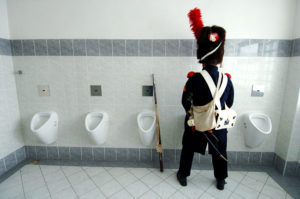It has seemed in recent months as though the Conservative Party’s energy has been directed not into governing, but into the public staging of a series of thinly-conceived morality tales about the comeuppance awaiting naughty parliamentarians — stories about the profane activities of an MP named Parish and an alleged sex-pest named Pincher. That is, at least, until the writing at last appeared on the artisanal Wallpaper.
All the same, it is a serious question: which vices should we want our politicians to have? The normative demands of politics are significantly different from those of everyday life, and this fact rubs up uncomfortably against the misguided, but popular, expectation that our politicians should not merely represent us, but resemble us too. This places MPs, especially senior ones, in something of a predicament: they must dissimulate so as to appear less exceptional, but at the same time prove themselves the only person fit for the job. The simulation of normality is something of a high-wire act not least because, as the current Tory leadership race is illustrating in real time, the imperative to present oneself as ordinary can take on a crazed, desperate quality, a neediness which strikes the rest of us as, well, slightly weird.
If readers want to be freed from the expectation that their politicians should be remotely like them and — even more so in this direction — vice versa, they might try reading Alan Clark’s Diaries.
Perhaps no one did more to reveal the deformations inherent in the political psyche. Entering the Commons in 1974, Clark must at first have seemed an archetype of the kind of wayward backbencher the Conservatives are generally better at producing then their opponents: unruly, temperamental, little-concerned for party discipline, more interested in being admired by a selective group of colleagues than liked by the elective public. He longed, however, for government position and the first volume of his Diaries, a bestseller in 1993, records his years spent as a Minister under Margaret Thatcher, first at the desultory Department of Employment (re-christened, by Clark, the “Department of Un-employment”), and later (much more to his taste) at the Ministry of Defence.
Diaries often provide a much more direct form of psychological access to their subjects than memoirs, and Clark’s are wildly unguarded. Take this entry, from 23rd June 1983, a mere ten days after Clark had first entered government. Surveying the street below his office balcony, he writes: “Sometimes I get a wild urge to relieve my bladder over it, splattinlgy on the ant-like crowds. Would this get one the sack? Probably not. It would have to be hushed up. Trivial, but at the same time bizarre… I might do it on my last day.”
The whimsical delight in a mad fantasy of pointless transgression is Clark to a tee; not just the offence itself, but the school-boy glee at the thought of dower-faced officials, poor squares, frantically trying to keep up political appearances. As is often the case with Clark, the puzzle is not so much that he has these thoughts, but that he thinks it a good idea to write them down and collect them between hardcovers so that other people can read them. Still more, that he could do all this and then spend the next few years wondering self-pityingly why John Major hasn’t put him in the House of Lords yet.
Not everyone in government thought it better to have Clark in-the-tent-pissing-out. We quickly see why. The voice that emerges in the Diaries is spoilt, snobbish, monstrously vain, impulsive to the point of recklessness, hypochondriacal, sentimental, over-sexed, and completely unsparing of the feelings of others. Clark was an unusual composite of dispositions: a kind of Romantic Thatcherite.
“The Lady”, as he insisted on referring to her, always took his phone calls — immediately — and sturdily overlooked the fact that he was an obvious political liability. Clark would, for instance, go on Question Time and be mocked by Sue Lawley (whom he dismisses as a “silly bitch”) for refusing to defend his own government’s policy; or, as he did on one occasion, arrive at the dispatch box drunk after a wine tasting (“all marvellous bottles”) and give full show to his contempt for the illiterate speech his ministerial officials had prepared for him (“Sometimes I turned over two pages at once, sometimes three. What did it matter? There was no shape to it”).
There is a rule of thumb about the wrecking of political careers: with Labour MPs the cause is invariably money, and with Tories, sex. Clark’s self-confessed “lecherous tendencies” provide that rule with a fat confirmatory data-point. He seems to have subscribed to a kind of vitalistic theory of machismo energy according to which his sexual and political potency rose and fell together, and was always very disheartened when he woke up without an erection. Ahead of the count for his Plymouth seat in 1983, and sensing victory, Clark contemplated his 22-year-old Labour opponent, Frances Holland: “I’m madly in love with Frances Holland. I suspect she’s not as thin and gawky as she seems. Her hair is always lovely and shiny. Perhaps I can distract her at the count on Thursday and kiss her in one of those big janitor’s cupboards.”
The janitor’s cupboard. Not quite the electoral swing either party may have been hoping for. Clark can hardly look at a young woman without recording some version of the thought “pretty legs” or “phew-wotta-scorcher blonde with a lovely figure and lots of sparkle and confidence”. “I am interested in Clare, the au pair,” he writes. “I strolled over this evening, deliberately entered by the back door and chatted her up. She’s not pretty, but is sexual. Dairymaid.” He is randy to the point of self-parody, at funerals for colleagues murdered by the IRA (“the proximity of death always makes me sexual”), and at Christmas carol concerts (“I only can properly enjoy carol services if I am having an illicit affair with someone in the congregation. Why is this?”) Even watching Thatcher command the dispatch box he notices her “very small feet and attractive — not bony — ankles”.
In one spectacular confession of poor judgement, Clark appears to admit to an opportunistic hook-up on an outbound train from Waterloo: “[A] plump young lady came into my compartment at Waterloo. She was not wearing a bra, and her delightful globes bounced prominently… She was adorable. Am I crazy? Death wish? Above us in the Luggage rack the Red Box gleamed like a beacon.”
Old dogs can learn new tricks, however: later, as Defence Minister on a sojourn in Marrakesh, Clark turned down the tempting offer of an escort for the evening, with the jaded reflection that: “They’d be bound to take photographs, tape, video everything. For all I know, my bedroom has got a two-way mirror. So embarrassing for the dear PM — ‘I’m afraid it, er, looks as if Alan has been behaving, er, badly…’”
In fact, Sir Robert Armstrong, the head of the civil service at the time of Clark’s appointment to government, had worried openly that his libertine sexual practices made him a blackmail risk. Clark pointed out, somewhat persuasively, that blackmail is only an effective technique against those with some residual shame about the things that they do in private, and he had none. To this extent, his reputation for being accident-prone was ill-deserved. “A true gaffe is accidental,” Clark wrote. “Mine never are. I like to shock, and I do it (though not as often as I could) deliberately.”
All the same, can Clark possibly have meant to expose quite so much of himself? As is true of exhibitionists in general, he does not seem to find the right things embarrassing. It is no doubt true that the self-same qualities that made Clark a wonderful diarist also made him a rather lousy politician. But the notably cold-blooded regard he could have for others also left him with a very fine appreciative faculty, an “infallible eye for what is or is not political”.
His cursory portraits of colleagues are often particularly deadly, especially the ones that are supposed to be admiring. Jonathan Aitken is a “good friend and standby for many a dirty trick”. William Waldegrave is an “ambitious creep”, Ken Clarke, a “podgy life-insurance-risk”. “Norman Tebbit is truly formidable”, he records. “He radiates menace, but without being overtly aggressive… They arse-lick, massively, with Norman. Which he accepts, expressionlessly.” It is reassuring to hear a politician saying these things, not so much because they are intrinsically valuable insights, but because if they are not at least thinking them then they are not noticing enough.
Clark’s “infallible eye” also gave him a very steady view of what the business of politics was. He understood that gossip, bitching, dirty tricks, hypocrisy and betrayal were not epiphenomenal to the practice — nor really dysfunctional — but actually constitutive of it. Finding that he had been artfully misled by a scheming colleague, he feels not frustration, but a kind of disinterested admiration of the kind a sportsman might feel on being outmanoeuvred by a defter opponent (“I like this. If you’re a serious player, it’s no good being ‘straight’. You just won’t last”).
He had no interest in appearing “normal”. He would, no doubt, have regarded the prospect with a kind of aesthetic distaste. His disinclination to conceal his strange feelings, to lie, curtail his dissipated life-style and toe the party line, arose not, it seems, from any conviction about the importance of honesty in political life, but from a protective attitude toward his own character, which he refused to reshape to better please the public. Clark never mastered the coded way in which politicians learn to reveal and conceal themselves, nor did he want to. As such, he remained an expert spectator, but poor player, of the game.
What should we make of politicians who actually excel at the kind of character-acting apparently required by their profession? Of course, those who speak too fluently in the Whitehall style can find that they are punished for their lifeless performances. And rightly so; at best, this is an uncreative way of disguising one’s unedifying character from the public. If Clark suffered with a form of exhibitionism, these personalities suffer with something akin to inhibitionism. A more fearful possibility is that such people really do have nothing to hide; a danger in selecting politicians who perform too slickly in the approved style is that you may end up with leaders, not with fewer vices, but simply very little self-knowledge.
As Levin warily observes in Anna Karenina the impulse to work for the public good can seem to reveal not a positive quality, but something more like an absence, a lack of some underlying conception of what one’s own life is about. Perhaps, as Denis Healey famously mooted, what a better class of politician most needs is indeed “hinterland”, but where this implies the existence not just of a reservoir of deeper commitment, but also a refined capacity to keep these potentially shadowy areas of one’s life just out of sight, off-stage, concealed in the darker regions of the political personality.
Disclaimer
Some of the posts we share are controversial and we do not necessarily agree with them in the whole extend. Sometimes we agree with the content or part of it but we do not agree with the narration or language. Nevertheless we find them somehow interesting, valuable and/or informative or we share them, because we strongly believe in freedom of speech, free press and journalism. We strongly encourage you to have a critical approach to all the content, do your own research and analysis to build your own opinion.
We would be glad to have your feedback.
Source: UnHerd Read the original article here: https://unherd.com/




